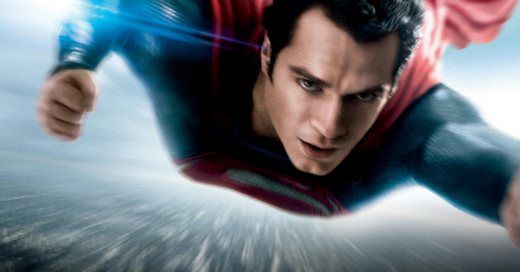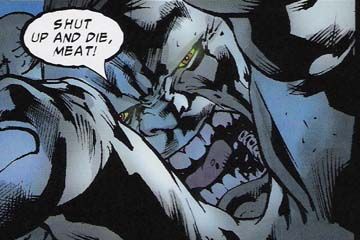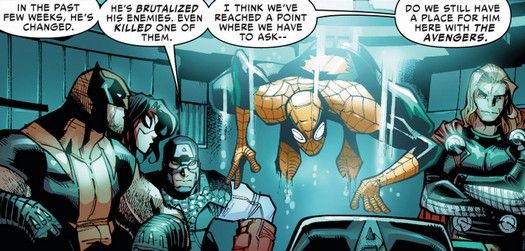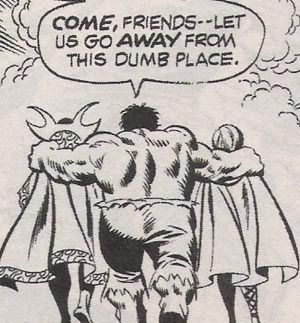(This post contains SPOILERS regarding Man of Steel. I consider your ass informed.)
So, the irony here is that as much as the climax to Man of Steel felt like a betrayal, I have no criticisms to aim at Zack Snyder. He made a good movie. Stuff blew up. Stuff fell down. Lots of punching. People died and it made me sweaty-eyed. Good flick. And hey, as a usual hater of Zack Snyder's work, I was more grateful than you know that he spared us his trademark fast-forward-slow-mo-fast-forward-slow-mo crap. Why has no one tapped this man to direct a Flash movie?
No, what Zack Snyder did made perfect sense. When Superman broke Zod's neck it was certainly a shock. I was angry. I was stunned. Mark Waid's description of his reaction to the moment felt sickeningly familiar.
But you know what? Snyder didn't do anything wrong. He didn't do anything that the rest of the writers of the superhero genre in every medium haven't been doing for years now. And yeah, that includes Mark Waid.
What Zack Snyder did, without knowing it, was send up a flare to show us a bloodier landscape of once innocent heroes now turned ultraviolent. Zack Snyder was a messenger, one toward whom I should be genuinely thankful.
Zack Snyder drew from me the simple revelation that should have been obvious a long time ago. He punctuated it so that I finally heard it. Superheroes have changed, they're not changing back any time soon, and it's time for me to cash out.
A lot of Snyder's defenders point out that, upon killing Zod, Superman immediately reacts traumatically to the realization of what he's done. He regrets the killing. Snyder claims he meant for the killing to be the foundation upon which Superman builds his unwavering respect for life. Presumably, Zod is meant to be the first and last man to die at Superman's hands.
I don't buy this. Man of Steel screenwriter David S. Goyer, in the same article I linked in the previous paragraph, says it changed because the original plan to have Zod sucked into the Phantom Zone simply didn't feel satisfying:
"Killing Zod was a big change and Chris Nolan, originally, said there's no way you can do this...That was a change - orginally Zod got sucked into the Phantom Zone along with the others and I just felt it was unsatisfying and so did Zack...Originally Chris didn't even want to let us try to write it and I said, 'We think we can figure out a way that you'll buy it.'"
So the "This will be why Superman never kills again" explanation is not the reason Superman killed Zod; it's the justification Snyder and Goyer used to make the choice palatable.
Not to mention that I didn't read Superman's anguish at killing Zod to be about the fact that he killed just anyone, but that he killed a Kryptonian. Zod's dialogue in that final battle is all about Superman needing to choose between the new Krypton Zod envisions and Earth, and by killing Zod the choice is made clear. Superman chooses Earth and it hurts.
Regardless, at least there's a consequence to Superman killing someone.
Anyone see The Avengers?
How many aliens are killed battling the Avengers in the invasion of New York City? Hawkeye shoots them with arrows, Black Widow shoots them or hacks at them with knives, Thor electrocutes them, Hulk squashes them like bugs, and even Captain America - the guy who holds the same moral authority in Marvel that Superman holds in DC - throws guys off a helicarrier, and slices off alien's arms with his shield. And no one belts out a Vader-circa-episode-3 "Noooo!" because of that.
Sure, they're just aliens.
And so was Zod.
The changes in Marvel's heroes came by inches, and with no announcements and little controversy. It started with The Ultimates: the reimagining of the Avengers in the company's "Ultimate" line of comics, a line initially so successful there were rumors that the regular Marvel continuity would be scrapped in favor of the Ultimate one. The Hulk of the Ultimates was a cannibal, an attempted rapist, and a mass murderer. Hank Pym and The Wasp's marriage was rife with fistfights. Captain America was an action hero bully, no one knew if Thor was really a god or just a mentally disturbed male nurse, and did I mention that Hulk ate people? Like, all the time.
It took time, but eventually the brutality of The Ultimates was reflected in Marvel's other comics. It wasn't quite so bad, but if nothing else killing grew much more palatable to the heroes of Marvel's bullpen. In spite of years of stories that said the opposite, in the New Avengers: Illuminati one-shot, it was revealed that the Hulk had killed thousands of people over the years during his rampages. In the first issue of Ed Brubaker's extraordinary run on Captain America, the Avenger killed (possibly without meaning to) a couple of terrorists when they fell off a speeding train, and when the info was relayed to Cap, he didn't seem to care that much. When the Avengers were re-formed - a group that used to be the most Absolutely-NO-Killing group of Marvel - they recruited Wolverine, a guy who's killed more people than the War of 1812.
More recently, a Doc-Ock controlled Spider-Man shot a man in the head. And unlike Superman at the end of Man of Steel, Marvel's "superior" Spider-Man was not in a situation in which he had little choice. The villain, Massacre, was defeated and on his knees. Spider-Man's justification for the murder is that eventually Massacre would live up to his namesake again and again and again until someone killed him.
That Spider-Man kills Massacre is not particularly surprising. After all, Peter Parker's body is possessed by a supervillain. What's noteworthy is the reaction of The Avengers.
Weeks after the murder, the team calls him in for questioning. They are not as concerned with the murder, however, as they are with their correct suspicions that Spider-Man is being controlled by someone else. There is a brief battle between Spidey and the rest of the team. They eventually subdue him and run their tests. They can find no evidence that Spidey's will has been usurped, so they apologize and let him go.
In the past if an Avenger had killed someone, even accidentally, a court-martial-like proceeding would have convened. Expulsion from the team was a very real possibility. But for an Avenger who had shot a kneeling, defeated enemy in the head? Forget expulsion from the team. That asshole would have been frozen in ice and shot into space.
Now, killing in Marvel comics isn't even much of a big deal. Even though one recent storyline in Hawkeye was about the attempt to retrieve a video tape that contained doctored footage of Hawkeye killing a man, he has no problem piercing a few throats while saving Spider-Man from thugs in the first issue of Age of Ultron. In an early issue of Savage Wolverine, Shanna the She-Devil accidentally kills a peaceful tribesman. The scene is meant to be funny. It's treated like slapstick. Teenage heroes are killing and dying every issue of Avengers Arena, Marvel's new Hunger Games clone. And in Indestructible Hulk #3, written by Mark Waid, Maria Hill shows someone a photo - again in a scene meant to be humorous - of the Hulk ripping a skrull soldier in half.
And of course all of the Marvel movies have given us killer heroes. Iron Man leaves one of his former captors to the mercies of an angry mob in Iron Man. In the more recent Iron Man 3 he brags "I'm gonna kill you first," to a gunman. In one of Incredible Hulk's deleted scenes, we see that most of the special ops soldiers who go after Bruce Banner in the beginning of the film are in body bags. As a friend pointed out while we debated Man of Steel's ending, one could convincingly argue that Batman, in spite of his "but I don't have to save you" line, does kill Ra's al Ghul at the end of Batman Begins. And of course, the bad guy body count of The Avengers is massive.
So, I guess what I'm trying to say here, is that, yes, Superman's killing of Zod was a betrayal. But, to use another recent pop culture shocker as metaphor, the Red Wedding was going on long before Man of Steel. Zack Snyder's knife was just one more in a crowd of knives. It's been going on for years and we're all a bunch of assholes for being surprised.
This is the direction in which superheroes are headed. It's the direction in which they have been heading for years, and I don't think there's any going back.
And that's why enough is enough. It's time for me to focus my energies on other things.
I have spent some years thinking and writing about superheroes. I made my way through college writing academic papers about them. For some time, I had hoped to eventually make a living writing about superhero comics, movies, and films. Man of Steel was a wake-up call. I don't love this genre anymore. At least, I don't love what it's become or what it will eventually become.
Understand, I have no moral problems with superheroes killing. I love violence in entertainment. My favorite superhero comic is still Watchmen, and my favorite comic regardless of genre is Lone Wolf & Cub, which features a protagonist who's hacked up more samurai and ninjas than that silly ass Logan-san ever did.
But for me, superheroes are all about one thing: life. Life is ultimately what concerns the superhero. It's why the term "crime-fighter" is so incomplete. Bruce Wayne does not become Batman because a mugger shatters his mother's pearl necklace. Peter Parker doesn't become Spider-Man because the man who shot his uncle also stole his uncle's car. Superman doesn't dole out parking tickets and Daredevil couldn't give two shits about crooked car salesman unless they start killing people.
For me, the thing that is so wonderful and heartbreaking about superheroes is that they dedicate themselves to a beautiful impossibility: that no one will ever again fall victim to violence. No one, anywhere, anywhen. And for those same guardians of life to take lives does not seem like truth to me. It is a lie. It is a betrayal.
That's why I feel nothing but absolute distaste for the works of Mark Millar; including Kick-Ass, Wanted, and the first two volumes of The Ultimates. I don't doubt his talent, but I am revolted by his vision. Judging by his body of work, Mark Millar looks at superheroes and sees nothing but sadistic bullies, and so he writes fiction that revels in the dark glee of that sadism. And that's fine. I make no moral judgments about Millar or anyone who enjoys his work. But to me it is the absolute antithesis of the superhero and I want no part of it.
Unfortunately, the writers of superhero fiction seem to feel differently.
It seems nothing but a waste for me to continue writing about superheroes, or following their stories quite as much. I don't have the enthusiasm for it. I don't care. I don't want to define myself anymore by my interest in the genre, and I have a heavy heart about it but it feels right.
That doesn't mean I won't watch superhero movies or read superhero comics. I still have graphic novels in my Amazon Wish List. The first expansion to Legendary: A Marvel Deck Building Game is on its way to my house as we speak, as is Batman: The Gotham City Strategy Game.
But I don't think quite as much of money will go into this interest, nor as much time. I think all the little (mostly Hulk-related) comic book knick-knacks are going to get stored in a box somewhere.
I suspect it's a good thing this happened. I have wanted to focus more on literary interests and pursuits for a while now, but distraction is a hard habit to shake.
I find it regrettable that superhero fiction is becoming generic action-adventure. Fast and the Furious with a superhero overlay. Bad Boys II with tights. But I'm not going to beat my head against inevitability. Life is too short.
Enjoy the blood. I'm going to go read a book.




